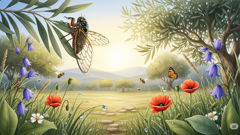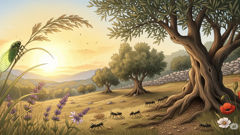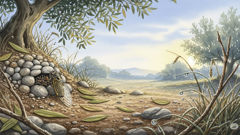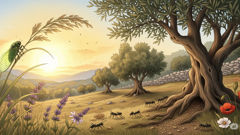Introduction
Beneath the sprawling blue sky of ancient Greece, where olive trees whisper in the gentle breeze and sunlight dapples the earth in golden patterns, life moved in quiet harmony. Hills rolled softly toward the horizon, their slopes dusted with wild thyme and lavender, while the distant call of the shepherd’s flute mingled with the murmur of cicadas. In a clearing bordered by gnarled olive trunks and wildflowers, a bustling ant colony made its home, their tunnels weaving like secrets beneath the sun-warmed soil. Above ground, the world felt vibrant and alive—a place where every stone, every leaf, every breath of air seemed to glow with the promise of summer. Yet even in this land of abundance, where figs hung heavy and wheat swayed in the fields, nature’s rhythms held lessons for those who paid attention. The cicada, with emerald wings and a voice as clear as the mountain spring, perched atop a swaying blade of grass, singing her song to the world. Her melody rose and fell like the tides, a celebration of sunshine and the freedom that came with it. Nearby, the ants marched in steady lines, their tiny legs moving with purpose as they gathered seeds and grains, building their stores with methodical determination. They worked from dawn until dusk, seldom pausing, their minds fixed on the promise of tomorrow’s needs. Their world was one of planning, discipline, and collective effort—a sharp contrast to the cicada’s days of music and dreams. As the sun traced its arc across the sky, casting long shadows through the grove, these two creatures—so different in spirit—would find their paths entwined. Their story, echoing through generations, would come to reveal the wisdom of preparation, the joy of living in the moment, and the delicate balance between the two. Here, under the ancient olive branches and the watchful gaze of the gods, unfolds the tale of the cicada and the ant: a fable as old as time, yet as relevant today as it was beneath the summer skies of Greece.
The Song of Summer: Cicada's Joyful Days
The cicada’s days unfurled in endless ribbons of song. From the first blush of dawn, when dew still clung to the wildflowers and light spilled across the grove like liquid gold, she woke with music in her heart. Perched on a reed that swayed above the world, she would fill the air with shimmering notes that rose and twined around the olive branches, drifting on the breeze to the distant hills. Her song was her joy—pure, unburdened, a melody that danced with sunlight and laughter. She sang not for an audience, but because the world itself seemed to invite her voice: the chirr of insects, the distant lowing of goats, the hush of leaves shifting overhead. Each note was a celebration of the present, an ode to all that was fleeting and beautiful.

While the cicada sang, her world was a canvas painted with vibrant colors. The grasses glittered with morning dew; poppies and bluebells nodded in approval. Bees hovered lazily above blossoms, and butterflies traced lazy arcs between thistle and thyme. The air smelled of earth and promise. Every moment felt infinite—why worry about tomorrow when today was so wondrous?
Occasionally, the cicada would pause her song to watch the ants below. They moved with such relentless energy, each one a link in a chain of purpose. Their tiny bodies shimmered in the sunlight as they carried seeds twice their size, vanishing into hidden doorways beneath the roots. To the cicada, their labor seemed alien—endless, repetitive, almost joyless. She would call down to them in her clear, lilting voice, asking why they didn’t stop to listen to her music or rest beneath a leaf and admire the sky.
The ants, however, had little time for song. Their world revolved around the rhythm of work. Each grain of wheat, each crumb of bread, each scrap of dried fig was a victory—a piece of insurance against the days when the sun would no longer shine so kindly. Their queen, wise and ancient, had taught them that fortune favored those who prepared. So, they toiled on, ears deaf to the cicada’s music, minds fixed on the future.
Yet even as they worked, the cicada’s song became part of their days—a background hum that softened the edges of their labor. Now and then, a young ant would pause, antennae quivering, as if caught by the beauty of the melody. But always, a gentle nudge from a sibling would remind them of their duties. Life, for the ants, was a tapestry woven from routine and discipline, colored only faintly by the music that floated above.
As summer deepened, the world grew lush and fragrant. The fields ripened under the sun’s patient gaze; vines sagged with grapes, and golden wheat swayed in the wind. The cicada’s song soared ever higher, an anthem of contentment. She bathed in sunlight, sipped nectar from wild blossoms, and dreamt only of the next song. For her, time was a gentle river—slow, meandering, and endless. The thought of winter was a shadow she never bothered to chase away.
Ants at Work: The Labor of Preparation
Beneath the shade of the olive trees, a different world thrived—a world of discipline and community. The ant colony was a marvel of organization, each tunnel and chamber meticulously crafted to house food and shelter the colony through any storm. Their days were marked by ceaseless motion. Lines of ants stretched like tiny rivers along the ground, each ant bearing a precious load: a grain of wheat, a crumb of honeycomb, a seed plucked from the dry grass. Every journey was purposeful, every task a link in the chain of survival.

Their leader, an old ant with antennae bent by years of toil, kept watch from the entrance to the colony. She remembered seasons when food was scarce and cold crept into every corner of their home. She taught the young ants that happiness was earned through effort, that comfort in winter was the fruit of summer’s labor. Under her guidance, the ants worked together in harmony. They shared the burdens, celebrated each small victory, and never lost sight of their goal: to build a future where no ant would go hungry.
As the sun beat down, the ants’ bodies glistened with sweat. Yet they marched on, their will unbroken. Now and then, their path crossed with that of the cicada. She would call out, inviting them to rest beneath the shade, to share in the lazy warmth of the afternoon. Some ants paused, tempted by the promise of ease and music. But always, duty called them back. They knew that soon, the days would grow shorter, the winds colder, and the fields barren. Their stores must be full before the last leaf fell.
Despite their focus, the ants were not without joy. They found it in the rhythm of their work, in the camaraderie of shared purpose. They told stories as they toiled, inventing tales of daring adventures beneath the roots or competitions to see who could carry the heaviest seed. Their laughter, though softer than the cicada’s song, was woven into every task—a quiet celebration of life’s struggles and triumphs.
As weeks passed, the ants’ stores grew. Their tunnels brimmed with seeds, dried fruit, and bits of honeycomb. They built chambers for the young, warm and safe from the coming chill. Though their world was hidden from the sun’s gaze, they felt a satisfaction deeper than any passing pleasure. They knew that when the cold winds swept across the land and food became scarce, their colony would endure.
The First Chill: Cicada’s Plight and Ants’ Refuge
As the days slipped quietly into autumn, the grove changed its face. The sun lingered lower in the sky, casting long shadows across the fields. The once-lush grasses faded to gold, and the wildflowers bowed their heads to the coming season. Even the olive leaves lost some of their silver sheen, trembling in the cool wind. The cicada’s song grew softer, tinged now with a note of longing. Her wings, once iridescent and strong, began to tire as she flitted from branch to branch searching for warmth. The world that had seemed endless now felt fragile and fleeting.

One morning, a shiver ran through the grove. Dew hung heavy on every blade of grass, and the wind carried a sharpness that stung. The cicada awoke to find her world transformed. The nectar had dried up; the flowers were gone. Her voice trembled as she tried to sing, but hunger gnawed at her belly and cold crept into her bones. She watched as the ants continued their steady march, but now their lines disappeared quickly into the earth. The entrances to their colony were sealed with smooth stones and packed earth, a fortress against the gathering cold.
Desperate, the cicada fluttered down to the entrance of the ant colony. She knocked gently, her wings shaking. “Dear ants,” she called softly, “I am cold and hungry. I have no food stored for winter. Will you share some of your stores with me?” The old ant appeared at the entrance, her face kind but firm. “What did you do all summer while we were working?” she asked. The cicada lowered her eyes. “I sang,” she whispered, “and made music for the world.”
The old ant’s gaze softened, for she remembered the warmth that the cicada’s song had brought even to those who worked. Yet she knew the lessons of survival could not be ignored. “Your song brought us joy in the sunshine,” she replied gently, “but the cold winds do not feed empty bellies.” She offered the cicada a crumb—enough to ease her hunger for a moment. “Let this remind you: there is a season for song and a season for work.”
With a heavy heart, the cicada understood. She thanked the ant for her kindness and retreated to a hollow in the bark of an old tree. There, she huddled against the cold, her memories filled with golden days and songs that now seemed so distant. As frost crept across the grove, she dreamt of another summer—a time when she would remember to balance joy with wisdom.
Conclusion
Winter arrived with quiet certainty, draping the ancient grove in silence. The olive trees stood bare against the gray sky, their branches etched like ink against the cold air. Deep beneath the earth, the ants huddled together in their warm, well-stocked chambers, safe from hunger and frost. They shared stories in soft voices and remembered the music that had floated above their heads during brighter days. Even now, the faint memory of the cicada’s song warmed their hearts, reminding them that there was beauty even in toil. Outside, the cicada lay curled in her hollow, dreaming of sunlight and laughter. She understood now that every season carries its own wisdom: joy in summer, prudence in autumn, rest in winter. When spring returned and life awakened once more, she would still sing—but this time, she’d carry within her a new understanding. For life is richest when we savor both the beauty of the present and prepare for what lies ahead. Thus, the tale of the cicada and the ant endures—a gentle reminder that balance brings wisdom, and that harmony between diligence and delight is the key to a well-lived life.













